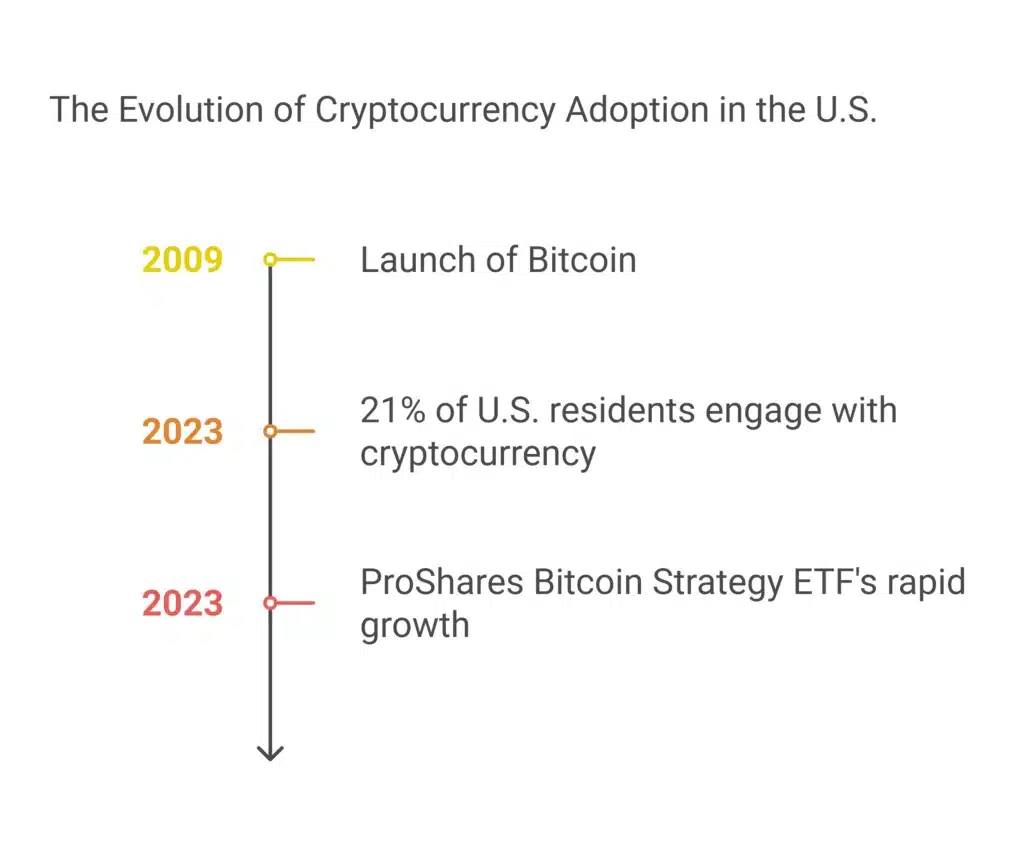Cryptocurrency has revolutionized the financial landscape in the past decade, and the U.S. continues to play a pivotal role in shaping its future. With the rapid advancements in blockchain technology and the increasing prevalence of digital assets like Bitcoin, the discussion around the future of cryptocurrency in the U.S. is more important than ever.
Understanding emerging trends, potential regulations, and growth opportunities for the future of cryptocurrency is vital for investors, tech enthusiasts, and financial analysts alike. What does the road ahead look like for Bitcoin in the U.S.? How do cryptocurrency regulations impact innovation and adoption? This blog will explore these questions and break down the key factors influencing the future of digital currency in the United States.
The Current State of Cryptocurrency Adoption in the U.S.
Growing Popularity of Bitcoin and Other Cryptocurrencies
Cryptocurrency adoption has grown exponentially since the launch of Bitcoin in 2009. The U.S. is among the leading nations in cryptocurrency adoption, with millions of Americans owning digital currencies. According to a recent Pew Research Center survey, as of 2023, 21% of U.S. residents have invested in, traded, or used cryptocurrency.
Bitcoin remains the most popular cryptocurrency in the U.S. Still, alternatives like Ethereum, Solana, and Cardano are gaining traction due to their unique applications, such as smart contracts and NFTs (non-fungible tokens). Major companies, including Tesla, MicroStrategy, and Coinbase, have embraced cryptocurrency, further solidifying its role within the financial ecosystem.
Institutional Investment is on the Rise
Institutional backing is a significant driver of cryptocurrency’s future in the U.S. Hedge funds, investment firms, and even traditional banks like JPMorgan Chase and Goldman Sachs are now dipping their toes into the crypto waters. These institutions are exploring cryptocurrency as a hedge against inflation, diversifying their investment portfolios, and catering to tech-driven clients.
Meanwhile, crypto ETFs (exchange-traded funds) continue to draw interest. For instance, the ProShares Bitcoin Strategy ETF became one of the fastest-growing ETFs, racking over $1 billion in assets within its first two days.
Consumer Use Case Expansion
The last few years have seen cryptocurrencies move beyond speculative investments. U.S.-based businesses are integrating crypto payments into their systems, with platforms like PayPal and Square supporting Bitcoin transactions. Industries such as retail, gaming, and e-commerce are starting to accept cryptocurrencies as payment, paving the way for mainstream usage.

How Cryptocurrency Regulations Could Shape the Future in the U.S.
Current Regulatory Framework
Regulations around cryptocurrency in the U.S. are a patchwork of federal and state policies, creating uncertainty for investors and businesses. Agencies such as the Securities and Exchange Commission (SEC) and the Commodity Futures Trading Commission (CFTC) currently oversee crypto markets, focusing on preventing bad actors and protecting consumers.
Additionally, states like Wyoming and Texas have enacted crypto-friendly policies to attract blockchain-based companies, while states like New York have strict policies under their BitLicense framework.
The Push for Clearer Cryptocurrency Regulations
A unified and transparent regulatory framework is one of the most debated issues surrounding cryptocurrency’s future in the U.S. Policymakers argue that clear regulations could protect consumers and prevent the misuse of cryptocurrencies while fostering innovation and protecting competitive advantages. Proposed bills, such as the Lummis-Gillibrand Responsible Financial Innovation Act, aim to clarify the regulatory treatment of digital assets.
Investors and tech enthusiasts are watching Congress and federal agencies for signs of progress to ensure smoother operations across the cryptocurrency space.
How Could Regulation Impact Bitcoin and Blockchain Innovation?
Stronger regulations could inspire consumer and institutional confidence, paving the way for more mainstream adoption of cryptocurrencies. On the other hand, excessive restrictions could stifle innovation, leading major crypto players to shift their operations to more lenient international markets.
For example, China’s crypto ban has driven many blockchain companies to explore more crypto-friendly alternatives like Singapore and Switzerland. If the U.S. does not strike the right balance, it risks ceding its position as a global hub for blockchain innovation.
Emerging Cryptocurrencies and Trends Shaping the Future in the U.S.
The Rise of Eco-Friendly Cryptocurrencies
One major challenge facing Bitcoin in the U.S. is its high energy consumption. Mining requires enormous computational power, driving concerns over environmental sustainability. However, several new cryptocurrencies like Cardano (ADA) and Algorand (ALGO) are addressing this issue by offering more energy-efficient, proof-of-stake mechanisms.
Decentralized Finance (DeFi)
The DeFi movement is building momentum, allowing users to engage in financial transactions like lending, borrowing, or earning interest directly through decentralized platforms. DeFi applications use cryptocurrencies and blockchain technology to eliminate intermediaries like banks, promising a disruptive future for traditional financial systems.
Central Bank Digital Currencies (CBDCs)
The U.S. Federal Reserve is also exploring the possibility of launching its digital currency, a Central Bank Digital Currency (CBDC). While still in the research phase, a CBDC backed by the U.S. could offer a government-regulated alternative to decentralized cryptocurrencies.

What Investors Need to Know About the Cryptocurrency Future in the U.S
For investors, the future of cryptocurrency in the U.S. is filled with opportunities and risks. Key factors that may impact its trajectory include:
- Market Volatility: While potential gains in cryptocurrency investment are significant, investors must be ready for extreme price fluctuations.
- Long-Term Viability: With more transparent regulations, cryptocurrencies could gain more credibility and stability over the long term.
- Diversification: Cryptocurrencies should not be the sole focus of an investment strategy; experts recommend diversification to minimize risk.
Many analysts agree that a thoughtful approach to cryptocurrency investing includes dollar-cost averaging and focusing on blue-chip assets like Bitcoin and Ethereum.
Why the Future of Cryptocurrency in the U.S. Depends on You
The next chapter of cryptocurrency will be partly written by those who participate in the space—investors, businesses, regulators, and everyday users. Whether you’re a financial analyst studying market trends or a tech enthusiast fascinated by blockchain’s potential, your curiosity and actions shape this evolving domain.
The U.S. continues to play a critical role in defining the future of cryptocurrency. With growing adoption, progressive innovations, and the potential for thoughtful regulation, the stage is set for digital assets to become an integral part of the financial landscape.
If you’re ready to explore cryptocurrency’s future, invest wisely, and stay informed, now is the time to act. Navigating this new frontier lies in education and staying engaged with trustworthy resources.


